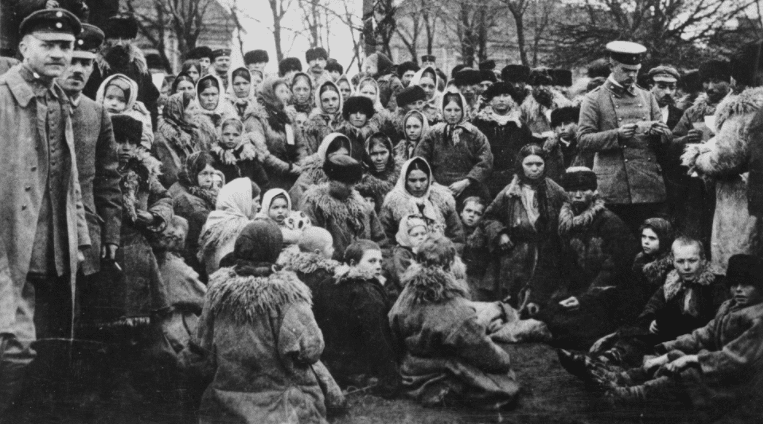Whose fault is antisemitism?
This is probably the most controversial question about anti-Jewish prejudice. Conservatives blame liberals. Liberals blame conservatives. Christians blame Muslims. Muslims blame Christians.
So who’s right? Is there a specific community that drives antisemitism? The answer is no.
That’s because antisemitism has always been spread by offenders across the ideological spectrum. “What is the worldly religion of the Jew? Huckstering,” declared the godfather of Communism Karl Marx in 1843. “What is his worldly God? Money.” Not long after, Marx’s contemporary Wilhelm Marr, the right-wing German nationalist who mainstreamed the term “antisemitism”– he was for it–declared that Jews didn’t share the same “sense of ethics” as non-Jews, because they “preferred to accumulate wealth.”
Marx and Marr didn’t agree on much, but they agreed on those self-serving money-grubbing Jews.

This antisemitic agreement didn’t just hold among political rivals. For centuries, the Christian church persecuted Europe’s Jews as Christ-killers and infidels. While Voltaire, the Enlightenment’s sharpest critic of the religious establishment, repeatedly assailed Judaism, calling Jews an “ignorant, stupid crude people.”
These examples are just the tip of the antisemitic iceberg. Throughout history, people with entirely opposite world views–from Nazi Germany’s Adolf Hitler to the Soviet Union’s Joseph Stalin–have somehow found a way to agree on one thing: persecuting Jewish people.
On the surface, this is pretty confusing. But it makes sense when you understand that antisemitism predates our modern categories, and stems from something far more fundamental: the human inability to tolerate difference.

Jews are the world’s oldest minority that has refused to conform to the majority culture. For thousands of years, Jews have persisted in their unique practices and traditions. Other groups have been persecuted for their differences, but because Jews have been around for so long, they’ve been on the receiving end more than most.
They were too stubbornly Jewish for religions like Christianity and Islam that sought to convert them; too religious for atheists and freethinkers like Voltaire; too closed off and clannish for the internationalist left like the communists of the Soviet Union, who put Jews in gulags; and too worldly and widespread for the nationalist right, who slurred them as “rootless cosmopolitans” undermining the state.

As an ever-present minority, Jews have been perpetually scapegoated for the majority’s problems, constantly cast as untrustworthy, and accused of serving their own interests at the expense of society’s.
In the Biblical book of Esther, the villain Haman tells the King, “There is a certain people dispersed among the peoples… who keep themselves separate. Their customs are different from all other people, and they do not obey the king’s laws; it is not in the king’s best interest to tolerate them.” This 2,000-year-old expression of antisemitism could’ve been written yesterday.
Unreal antisemitism from Rick Wiles at" TruNews"as he calls the Trump impeachment process a "Jew Coup" and says Jews will take over the country and "kill millions of Christians." pic.twitter.com/Ib29EmGCxW
— Elder of Ziyon 🇮🇱 (@elderofziyon) November 27, 2019
Take this recent broadcast by TruNews, a right-wing Christian news outlet that was accredited by the Trump White House:
“That’s the way the Jews work. They are deceivers. They plot, they lie, they do whatever they have to do to accomplish their political agenda.”
Rick Wiles, TruNews
Now listen to this 2015 interview with Jewish Senator Bernie Sanders (I-Vt.) by Diane Rehm on NPR, the polar opposite of TruNews. You’ll recognize some familiar themes:
Diane Rehm: “Senator, you have dual citizenship with Israel.”
Sen. Bernie Sanders: “What? Well no I do not have dual citizenship with Israel. I’m an Amer– That’s– I don’t know where that question came from… No, I’m an American citizen, period.”
Jews sought to escape their minority status by founding their own state–Israel. But now antisemites just accuse Jews everywhere, like Sanders, of disloyally working for Israel as part of a global conspiracy to control non-Jewish countries. These insinuations find their way from the internet into everyday interactions.
Caller: “Mr. Cardin looks like a regular white guy, nice guy, whatever, but in actuality he’s a Jewish white guy and if the public was informed of that by C-SPAN, I think they would take his comments differently… Because this guy is Jewish, that means that he is concerned about Israel…”
Senator Ben Cardin (D-Md.): “I normally am pretty tolerant to people who ask questions, but I’m not to your assumption. I take great offense to that. Our loyalty is to America, our concerns are to America.”
As they have throughout history, conspiracy theories about Jews undermining society have deadly consequences. In 2018, a white supremacist named Robert Bowers–who claimed Jews were scheming to replace whites with brown immigrants–massacred 11 worshippers in a Pittsburgh synagogue. In the years that followed, another white nationalist attacked a synagogue in California, while black extremists with entirely different world views shot up a kosher supermarket in New Jersey, and stabbed religious Jews at a Hanukkah gathering in New York.

The point here is not that antisemitism exists equally in all these communities. It’s that no community is immune to antisemitism, because no community is immune to the instinct to stigmatize difference.
Nowhere is this more apparent than Europe, where Jews surveyed from Spain to Sweden report experiencing serious antisemitism from all directions.
This testimony reflects real world bigotry, whether it’s Poland’s Christian conservative party passing laws to repress studying the Holocaust and Polish complicity in it; Hungary’s nationalist leaders leading a state-sponsored campaign demonizing Jewish financier George Soros, blaming him for the country’s problems and comparing him to Hitler; Britain’s preeminent left-wing party failing to stop pervasive antisemitism in its ranks under leader Jeremy Corbyn; or Jews in France being subjected to countless violent attacks at the hands of Islamic extremists; as you can see, antisemitism is the ultimate equal opportunity offender.

So why does antisemitism continue to flourish across the spectrum? The answer is simple: people only tend to police anti-Jewish bigotry when it comes from the other side, not their own.
It’s understandable why this happens. After all, it’s much easier to condemn the prejudice of people you already despise and disagree with. It’s a lot harder to speak up when the bigotry is coming from your friends and allies.
But think about it: Where do you have the power to make change? Among your friends–or among your enemies? In your community–or in someone else’s?
Yet too often, our national conversation about antisemitism consists of people trying to bounce antisemites from parties they weren’t invited to–conservatives policing progressive antisemitism, progressives policing conservative antisemitism, and so on.
You don’t have to be an expert in antisemitism to see why this doesn’t work.

So how can we stop this from happening, and start fighting the antisemites instead of each other?
The secret is this: Focus on the antisemitic ideas expressed, not the individual expressing them. If we train ourselves to recognize anti-Jewish sentiments, rather than getting distracted by their source, we will be much more successful at identifying and uprooting the hateful ideas across the board. But if we pick and choose which antisemitism to care about based on who says it, and give our own community a pass, the bigotry will continue to spread unchecked.
Because the truth is: casting anti-Jewish prejudice as a specifically left-wing problem… or right-wing problem… or Christian problem… or Muslim problem… is really just a way of saying that it’s someone else’s problem.
The only people who win this argument over who’s the bigger bigot are the antisemites, who continue to spread their hate while their supposed opponents point fingers at each other.
To truly combat antisemitism, we need to stop thinking of it as other people’s problem, and start confronting it as our problem.
